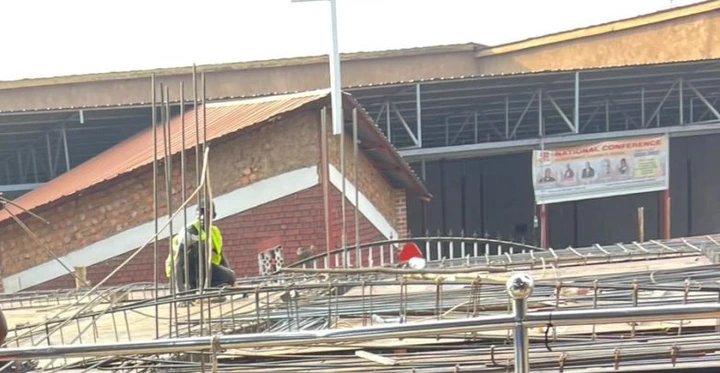Report Blames Illegal Construction for Kampala Floods

Ham Enterprises continue to erect structures near Nakivubo channel despite an order from KCCA to stop the works
Kampala — A confidential Kampala Capital City Authority (KCCA) report seen by ChimpReports has blamed illegal construction and regulatory failures for the deadly floods that swept through downtown Kampala last month, as Uganda’s Engineers Registration Board (ERB) warns that ongoing redevelopment of the Nakivubo Channel risks “catastrophic consequences” if proper technical standards are ignored.
The October 3, 2025 City Executive Committee (CEC) report links the flooding to unauthorized developments over key drainage corridors, including large commercial buildings allegedly erected by Hamis Kiggundu’s Ham Enterprises (U) Ltd on sections of the Nakivubo and Jugula channels without KCCA approval.
“The recent heavy rainfall that hit Kampala on October 6th and 31st left most parts of downtown, including the central business district, submerged,” the report states.
“The floods swept through shops, arcades, the New Taxi Park, and St. Balikuddembe Market, causing damage worth billions and claiming more than four lives.”
KCCA leaders argue the flooding was aggravated by “human interference with engineered drainage infrastructure and failure to enforce development controls,” not just extreme weather.
ERB Warns of Technical Non-Compliance
Uganda’s Engineers Registration Board (ERB), the statutory body overseeing engineering practice, has separately written to KCCA expressing alarm at the Nakivubo Channel works.
In a letter dated October 6, 2025, ERB Chairman Prof. Eng. Henry Mwanaki Alinaitwe said any redevelopment of the channel “must be undertaken after the requisite mandatory studies and technical assessments have been carried out.”
Header advertisement
“Otherwise, undertaking such a major infrastructure project without adherence to established engineering standards and procedures poses serious risks and could lead to catastrophic consequences,” Alinaitwe warned.
The ERB requested KCCA to disclose the identities and registration status of engineers and firms engaged in the project, along with flood modeling data, drainage capacity studies, and environmental safeguards.
The Board emphasized the need for climate-resilient designs that account for Kampala’s rapid urbanization and runoff pressures.
“The redevelopment of the Nakivubo Channel must integrate flood-risk modeling, solid waste management, and adaptive design to prevent future urban disasters,” the ERB said.
Allegations of Collusion and Poor Oversight
KCCA’s internal report accuses former Acting Executive Director Frank Rusa of colluding with individuals within the Authority to terminate criminal proceedings that had been initiated against Ham Enterprises over illegal encroachment.
It also references a formal complaint by Archbishop Paul Ssemwogerere regarding the alienation of Church land and blocked access to St. Balikuddembe and St. Anthanasius shrines.
Despite earlier floods in November 2024 that killed more than 10 people, the Authority says a council resolution passed in April 2025 “frustrated enforcement” and was later used by developers and government officials as justification to continue construction.
“The Council’s decision to commend Mr. Rusa instead of enforcing the law was disillusioning,” said Lord Mayor Erias Lukwago, who signed the CEC report. “It has since been exploited to justify ongoing illegal construction over public drainage.”
Traders Demand Action
Following the October floods, traders’ associations such as KACITA, KATA, and FUTA petitioned KCCA for compensation and demanded that construction on the Nakivubo Channel be halted.
A stakeholders’ meeting chaired by the Lord Mayor on November 3 resolved to suspend all ongoing works by Ham Enterprises and KIHAM, inspect the site jointly with traders, and assess losses through the Directorate of Gender and Community Services.
The meeting also agreed to seek emergency support from the Office of the Prime Minister and to engage the Bank of Uganda to help reschedule loans for affected traders.
Call for National Funding and Accountability
The City Executive Committee reiterated calls for the Central Government and Parliament to finance the Kampala Drainage Master Plan (KDMP), adopted in 2016 but never fully implemented.
It proposed reallocating USD 18 million from the GKMA-UDP loan to fund compensation for project-affected persons and complete critical channels, including Lubigi, Nalukolongo, and Kaliddubi.
The report further calls for the demolition of illegal structures, disciplinary action against implicated KCCA officials, and an Inspector General of Government (IGG) probe into how private developers obtained land titles over drainage corridors and wetlands.
Urban Planning Under Strain
Experts say Kampala’s flooding crisis reflects a broader failure of coordinated urban management. The Nakivubo Channel, which drains stormwater into Lake Victoria, is overwhelmed by siltation, encroachment, and waste dumping, while climate change has intensified rainfall patterns.
“The floods are not acts of God,” Lukwago said. “They are a direct result of impunity, corruption, and disregard for engineering and environmental laws.”
The combined warnings from KCCA and the Engineers Registration Board underscore the deep governance and technical gaps undermining Kampala’s infrastructure. As downtown traders count losses running into billions, the controversy over Nakivubo’s redevelopment has become a defining test of how Uganda’s capital confronts its twin crises of unplanned urban growth and environmental vulnerability.



0 Comments